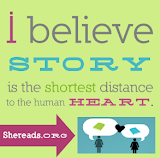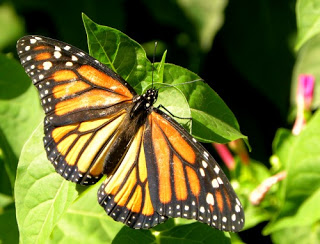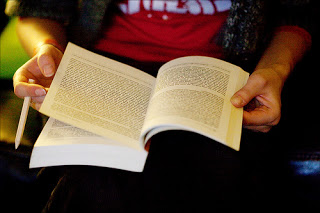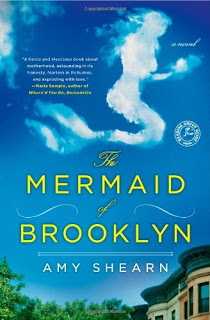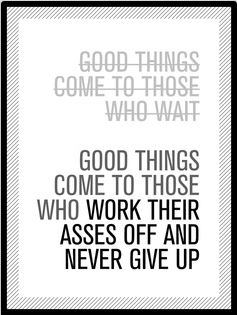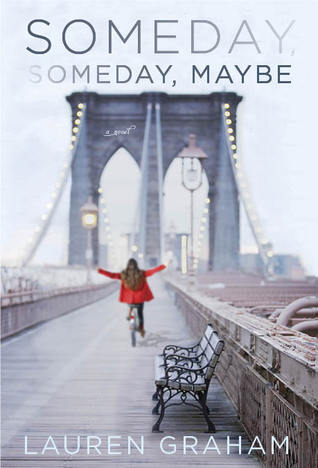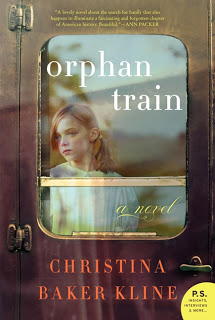Lauren Graham wrote a novel—sharp, poignant, snort-coffee-out-your-nose funny novel that you do not want to miss. Her debut SOMEDAY, SOMEDAY MAYBE earned my Buy It NOW rating over on Bookshelf Bombshells. I absolutely adored this book. Rush over there and read the full review.
But here’s a quick synopsis from Goodreads:
 Franny Banks is a struggling actress in New York City, with just six months left of the three year deadline she gave herself to succeed. But so far, all she has to show for her efforts is a single line in an ad for ugly Christmas sweaters and a degrading waitressing job. She lives in Brooklyn with two roommates-Jane, her best friend from college, and Dan, a sci-fi writer, who is very definitely not boyfriend material-and is struggling with her feelings for a suspiciously charming guy in her acting class, all while trying to find a hair-product cocktail that actually works.
Franny Banks is a struggling actress in New York City, with just six months left of the three year deadline she gave herself to succeed. But so far, all she has to show for her efforts is a single line in an ad for ugly Christmas sweaters and a degrading waitressing job. She lives in Brooklyn with two roommates-Jane, her best friend from college, and Dan, a sci-fi writer, who is very definitely not boyfriend material-and is struggling with her feelings for a suspiciously charming guy in her acting class, all while trying to find a hair-product cocktail that actually works.
Meanwhile, she dreams of doing “important” work, but only ever seems to get auditions for dishwashing liquid and peanut butter commercials. It’s hard to tell if she’ll run out of time or money first, but either way, failure would mean facing the fact that she has absolutely no skills to make it in the real world. Her father wants her to come home and teach, her agent won’t call her back, and her classmate Penelope, who seems supportive, might just turn out to be her toughest competition yet.
Someday, Someday, Maybe is a funny and charming debut about finding yourself, finding love, and, most difficult of all, finding an acting job. ~from Goodreads

Since Ms Graham’s delightful novel left me to twitching in Gilmore Girl withdrawal, I decided to jump on the Rory Gilmore Reading Challenge.
You’ve probably seen this make the rounds, as I’m always a few years late to the party, but I’m a sucker for book lists and reading challenges.
I’ve had a huge hole in my television viewing pleasure since that smart and sassy show went off the air years ago. {If you never watched it, go back and buy the entire series on dvd. NOW. You won’t regret it.}
Rory Gilmore was a breath of fresh air in a TV world dominated by brainless bimbos fighting over boys and their fifteen minutes of fame. Between her brains, bookworm tendencies, and her witty banter she broke the Hollywood mold of what a typical American teenage girl should be and gave a generation someone to emulate.
And she got the hot guys anyway.
This meme/challenge lists 250 books mentioned by Rory during the show’s run. I didn’t count them to verify.
The books in orange I know I’ve read. I’m embarrassed to admit that there are many on the list I can’t remember if I actually read or just saw the movie. (I’ve been reading for a loooong time…)
How would you do?
1984 by George Orwell
The Adventures of Huckleberry Finn by Mark Twain
Alice in Wonderland by Lewis Carroll
The Amazing Adventures of Kavalier & Clay by Michael Chabon
An American Tragedy by Theodore Dreiser
Angela’s Ashes by Frank McCourt
Anna Karenina by Leo Tolstoy
Anne Frank: The Diary of a Young Girl by Anne Frank
Archidamian War by Donald Kagan
The Art of Fiction by Henry James
The Art of War by Sun Tzu
As I Lay Dying by William Faulkner
Atonement by Ian McEwan
Autobiography of a Face by Lucy Grealy
The Awakening by Kate Chopin
Babe by Dick King-Smith
Backlash: The Undeclared War Against American Women by Susan Faludi
Balzac and the Little Chinese Seamstress by Dai Sijie
Bel Canto by Ann Patchett
The Bell Jar by Sylvia Plath
Beloved by Toni Morrison
Beowulf: A New Verse Translation by Seamus Heaney
The Bhagava Gita
The Bielski Brothers: The True Story of Three Men Who Defied the Nazis, Built a Village in the Forest, and Saved 1,200 Jews by Peter Duffy
Bitch in Praise of Difficult Women by Elizabeth Wurtzel
A Bolt from the Blue and Other Essays by Mary McCarthy
Brave New World by Aldous Huxley
Brick Lane by Monica Ali
Bridgadoon by Alan Jay Lerner
Candide by Voltaire – read – June 2010
The Canterbury Tales by Chaucer
Carrie by Stephen King
Catch-22 by Joseph Heller
The Catcher in the Rye by J. D. Salinger – read
Charlotte’s Web by E. B. White
The Children’s Hour by Lillian Hellman
Christine by Stephen King
A Christmas Carol by Charles Dickens
A Clockwork Orange by Anthony Burgess
The Code of the Woosters by P.G. Wodehouse
The Collected Short Stories by Eudora Welty
The Collected Stories of Eudora Welty by Eudora Welty
A Comedy of Errors by William Shakespeare
Complete Novels by Dawn Powell
The Complete Poems by Anne Sexton
Complete Stories by Dorothy Parker
A Confederacy of Dunces by John Kennedy Toole
The Count of Monte Cristo by Alexandre Dumas
Cousin Bette by Honor’e de Balzac
Crime and Punishment by Fyodor Dostoevsky
The Crimson Petal and the White by Michel Faber – started and not finished
The Crucible by Arthur Miller
Cujo by Stephen King
The Curious Incident of the Dog in the Night-Time by Mark Haddon – read – 2009
Daughter of Fortune by Isabel Allende
David and Lisa by Dr Theodore Issac Rubin M.D
David Copperfield by Charles Dickens
The Da Vinci -Code by Dan Brown
Dead Souls by Nikolai Gogol
Demons by Fyodor Dostoyevsky
Death of a Salesman by Arthur Miller
Deenie by Judy Blume
The Devil in the White City: Murder, Magic, and Madness at the Fair that Changed America by Erik Larson
The Dirt: Confessions of the World’s Most Notorious Rock Band by Tommy Lee, Vince Neil, Mick Mars and Nikki Sixx
The Divine Comedy by Dante
The Divine Secrets of the Ya-Ya Sisterhood by Rebecca Wells
Don Quijote by Cervantes
Driving Miss Daisy by Alfred Uhrv
Dr. Jekyll & Mr. Hyde by Robert Louis Stevenson
Edgar Allan Poe: Complete Tales & Poems by Edgar Allan Poe
Eleanor Roosevelt by Blanche Wiesen Cook
The Electric Kool-Aid Acid Test by Tom Wolfe
Ella Minnow Pea: A Novel in Letters by Mark Dunn
Eloise by Kay Thompson
Emily the Strange by Roger Reger
Emma by Jane Austen
Empire Falls by Richard Russo
Encyclopedia Brown: Boy Detective by Donald J. Sobol
Ethan Frome by Edith Wharton
Ethics by Spinoza
Europe through the Back Door, 2003 by Rick Steves
Eva Luna by Isabel Allende
Everything Is Illuminated by Jonathan Safran Foer
Extravagance by Gary Krist
Fahrenheit 451 by Ray Bradbury
Fahrenheit 9/11 by Michael Moore
The Fall of the Athenian Empire by Donald Kagan
Fat Land: How Americans Became the Fattest People in the World by Greg Critser
Fear and Loathing in Las Vegas by Hunter S. Thompson
The Fellowship of the Ring: Book 1 of The Lord of the Ring by J. R. R. Tolkien (TBR) – read
Fiddler on the Roof by Joseph Stein
The Five People You Meet in Heaven by Mitch Albom
Finnegan’s Wake by James Joyce
Fletch by Gregory McDonald
Flowers for Algernon by Daniel Keyes
The Fortress of Solitude by Jonathan Lethem
The Fountainhead by Ayn Rand
Frankenstein by Mary Shelley
Franny and Zooey by J. D. Salinger
Freaky Friday by Mary Rodgers
Galapagos by Kurt Vonnegut
Gender Trouble by Judith Butler
George W. Bushism: The Slate Book of the Accidental Wit and Wisdom of our 43rd President by Jacob Weisberg
Gidget by Fredrick Kohner
Girl, Interrupted by Susanna Kaysen
The Gnostic Gospels by Elaine Pagels
The Godfather: Book 1 by Mario Puzo
The God of Small Things by Arundhati Roy – started and not finished
Goldilocks and the Three Bears by Alvin Granowsky
Gone with the Wind by Margaret Mitchell
The Good Soldier by Ford Maddox Ford
The Gospel According to Judy Bloom
The Graduate by Charles Webb
The Grapes of Wrath by John Steinbeck
The Great Gatsby by F. Scott Fitzgerald
Great Expectations by Charles Dickens
The Group by Mary McCarthy
Hamlet by William Shakespeare
Harry Potter and the Goblet of Fire by J. K. Rowling
Harry Potter and the Sorcerer’s Stone by J. K. Rowling
A Heartbreaking Work of Staggering Genius by Dave Eggers
Heart of Darkness by Joseph Conrad (TBR)
Helter Skelter: The True Story of the Manson Murders by Vincent Bugliosi and Curt Gentry (TBR)
Henry IV, part I by William Shakespeare
Henry IV, part II by William Shakespeare
Henry V by William Shakespeare
High Fidelity by Nick Hornby
The History of the Decline and Fall of the Roman Empire by Edward Gibbon
Holidays on Ice: Stories by David Sedaris
The Holy Barbarians by Lawrence Lipton
House of Sand and Fog by Andre Dubus III (Lpr)
The House of the Spirits by Isabel Allende
How to Breathe Underwater by Julie Orringer
How the Grinch Stole Christmas by Dr. Seuss
How the Light Gets in by M. J. Hyland
Howl by Allen Gingsburg
The Hunchback of Notre Dame by Victor Hugo
The Iliad by Homer
I’m with the Band by Pamela des Barres
In Cold Blood by Truman Capote
Inferno by Dante
Inherit the Wind by Jerome Lawrence and Robert E. Lee
Iron Weed by William J. Kennedy
It Takes a Village by Hillary Clinton
Jane Eyre by Charlotte Brontë
The Joy Luck Club by Amy Tan
Julius Caesar by William Shakespeare
The Jumping Frog by Mark Twain
The Jungle by Upton Sinclair
Just a Couple of Days by Tony Vigorito
The Kitchen Boy: A Novel of the Last Tsar by Robert Alexander
Kitchen Confidential: Adventures in the Culinary Underbelly by Anthony Bourdain
The Kite Runner by Khaled Hosseini –
Lady Chatterleys’ Lover by D. H. Lawrence
The Last Empire: Essays 1992-2000 by Gore Vidal
Leaves of Grass by Walt Whitman
The Legend of Bagger Vance by Steven Pressfield
Less Than Zero by Bret Easton Ellis
Letters to a Young Poet by Rainer Maria Rilke
Lies and the Lying Liars Who Tell Them by Al Franken
Life of Pi by Yann Martel
Little Dorrit by Charles Dickens
The Little Locksmith by Katharine Butler Hathaway
The Little Match Girl by Hans Christian Andersen
Little Women by Louisa May Alcott
Living History by Hillary Rodham Clinton
Lord of the Flies by William Golding
The Lottery: And Other Stories by Shirley Jackson
The Lovely Bones by Alice Sebold
The Love Story by Erich Segal
Macbeth by William Shakespeare
Madame Bovary by Gustave Flaubert
The Manticore by Robertson Davies
Marathon Man by William Goldman
The Master and Margarita by Mikhail Bulgakov
Memoirs of a Dutiful Daughter by Simone de Beauvoir
Memoirs of General W. T. Sherman by William Tecumseh Sherman
Me Talk Pretty One Day by David Sedaris
The Meaning of Consuelo by Judith Ortiz Cofer
Mencken’s Chrestomathy by H. R. Mencken
The Merry Wives of Windsor by William Shakespeare
The Metamorphosis by Franz Kafka
Middlesex by Jeffrey Eugenides
The Miracle Worker by William Gibson
Moby Dick by Herman Melville
The Mojo Collection: The Ultimate Music Companion by Jim Irvin
Moliere: A Biography by Hobart Chatfield Taylor
A Monetary History of the United States by Milton Friedman
Monsieur Proust by Celeste Albaret
A Month Of Sundays: Searching For The Spirit And My Sister by Julie Mars
A Moveable Feast by Ernest Hemingway
Mrs. Dalloway by Virginia Woolf
Mutiny on the Bounty by Charles Nordhoff and James Norman Hall
My Lai 4: A Report on the Massacre and It’s Aftermath by Seymour M. Hersh
My Life as Author and Editor by H. R. Mencken
My Life in Orange: Growing Up with the Guru by Tim Guest
Myra Waldo’s Travel and Motoring Guide to Europe, 1978 by Myra Waldo
My Sister’s Keeper by Jodi Picoult
The Naked and the Dead by Norman Mailer
The Name of the Rose by Umberto Eco
The Namesake by Jhumpa Lahiri
The Nanny Diaries by Emma McLaughlin
Nervous System: Or, Losing My Mind in Literature by Jan Lars Jensen
New Poems of Emily Dickinson by Emily Dickinson
The New Way Things Work by David Macaulay
Nickel and Dimed by Barbara Ehrenreich
Night by Elie Wiesel
Northanger Abbey by Jane Austen
The Norton Anthology of Theory and Criticism by William E. Cain, Laurie A. Finke, Barbara E. Johnson, John P. McGowan
Novels 1930-1942: Dance Night/Come Back to Sorrento, Turn, Magic Wheel/Angels on Toast/A Time to be Born by Dawn Powell
Notes of a Dirty Old Man by Charles Bukowski
Of Mice and Men by John Steinbeck
Old School by Tobias Wolff
On the Road by Jack Kerouac
One Flew Over the Cuckoo’s Nest by Ken Kesey
One Hundred Years of Solitude by Gabriel Garcia Marquez
The Opposite of Fate: Memories of a Writing Life by Amy Tan
Oracle Night by Paul Auster
Oryx and Crake by Margaret Atwood
Othello by Shakespeare
Our Mutual Friend by Charles Dickens
The Outbreak of the Peloponnesian War by Donald Kagan
Out of Africa by Isac Dineson
The Outsiders by S. E. Hinton
A Passage to India by E.M. Forster
The Peace of Nicias and the Sicilian Expedition by Donald Kagan
The Perks of Being a Wallflower by Stephen Chbosky
Peyton Place by Grace Metalious
The Picture of Dorian Gray by Oscar Wilde
Pigs at the Trough by Arianna Huffington
Pinocchio by Carlo Collodi
Please Kill Me: The Uncensored Oral History of Punk Legs McNeil and Gillian McCain
The Polysyllabic Spree by Nick Hornby
The Portable Dorothy Parker by Dorothy Parker
The Portable Nietzche by Fredrich Nietzche
The Price of Loyalty: George W. Bush, the White House, and the Education of Paul O’Neill by Ron Suskind
Pride and Prejudice by Jane Austen
Property by Valerie Martin
Pushkin: A Biography by T. J. Binyon
Pygmalion by George Bernard Shaw
Quattrocento by James Mckean
A Quiet Storm by Rachel Howzell Hall
Rapunzel by Grimm Brothers
The Raven by Edgar Allan Poe
The Razor’s Edge by W. Somerset Maugham
Reading Lolita in Tehran: A Memoir in Books by Azar Nafisi
Rebecca by Daphne du Maurier
Rebecca of Sunnybrook Farm by Kate Douglas Wiggin
The Red Tent by Anita Diamant
Rescuing Patty Hearst: Memories From a Decade Gone Mad by Virginia Holman
The Return of the King: The Lord of the Rings Book 3 by J. R. R. Tolkien (TBR) – read
R Is for Ricochet by Sue Grafton
Rita Hayworth by Stephen King
Robert’s Rules of Order by Henry Robert
Roman Holiday by Edith Wharton
Romeo and Juliet by William Shakespeare
A Room of One’s Own by Virginia Woolf
A Room with a View by E. M. Forster
Rosemary’s Baby by Ira Levin
The Rough Guide to Europe, 2003 Edition
Sacred Time by Ursula Hegi
Sanctuary by William Faulkner
Savage Beauty: The Life of Edna St. Vincent Millay by Nancy Milford
Say Goodbye to Daisy Miller by Henry James
The Scarecrow of Oz by Frank L. Baum
The Scarlet Letter by Nathaniel Hawthorne
Seabiscuit: An American Legend by Laura Hillenbrand
The Second Sex by Simone de Beauvoir
The Secret Life of Bees by Sue Monk Kidd
Secrets of the Flesh: A Life of Colette by Judith Thurman
Selected Hotels of Europe
Selected Letters of Dawn Powell: 1913-1965 by Dawn Powell
Sense and Sensibility by Jane Austen
A Separate Peace by John Knowles
Several Biographies of Winston Churchill
Sexus by Henry Miller
The Shadow of the Wind by Carlos Ruiz Zafon
Shane by Jack Shaefer
The Shining by Stephen King
Siddhartha by Hermann Hesse
S Is for Silence by Sue Grafton
Slaughter-house Five by Kurt Vonnegut
Small Island by Andrea Levy
Snows of Kilimanjaro by Ernest Hemingway
Snow White and Rose Red by Grimm Brothers
Social Origins of Dictatorship and Democracy: Lord and Peasant in the Making of the Modern World by Barrington Moore
The Song of Names by Norman Lebrecht
Song of the Simple Truth: The Complete Poems of Julia de Burgos by Julia de Burgos
The Song Reader by Lisa Tucker
Songbook by Nick Hornby
The Sonnets by William Shakespeare
Sonnets from the Portuegese by Elizabeth Barrett Browning
Sophie’s Choice by William Styron
The Sound and the Fury by William Faulkner
Speak, Memory by Vladimir Nabokov
Stiff: The Curious Lives of Human Cadavers by Mary Roach
The Story of My Life by Helen Keller
A Streetcar Named Desiree by Tennessee Williams
Stuart Little by E. B. White
Sun Also Rises by Ernest Hemingway
Swann’s Way by Marcel Proust
Swimming with Giants: My Encounters with Whales, Dolphins and Seals by Anne Collett
Sybil by Flora Rheta Schreiber
A Tale of Two Cities by Charles Dickens
Tender Is The Night by F. Scott Fitzgerald
Term of Endearment by Larry McMurtry
Time and Again by Jack Finney
The Time Traveler’s Wife by Audrey Niffenegger
To Have and Have Not by Ernest Hemingway
To Kill a Mockingbird by Harper Lee
The Tragedy of Richard III by William Shakespeare
A Tree Grows in Brooklyn by Betty Smith
The Trial by Franz Kafka
The True and Outstanding Adventures of the Hunt Sisters by Elisabeth Robinson
Truth & Beauty: A Friendship by Ann Patchett
Tuesdays with Morrie by Mitch Albom
Ulysses by James Joyce
The Unabridged Journals of Sylvia Plath 1950-1962 by Sylvia Plath
Uncle Tom’s Cabin by Harriet Beecher Stowe
Unless by Carol Shields
Valley of the Dolls by Jacqueline Susann
The Vanishing Newspaper by Philip Meyers
Vanity Fair by William Makepeace Thackeray
Velvet Underground’s The Velvet Underground and Nico (Thirty Three and a Third series) by Joe Harvard
The Virgin Suicides by Jeffrey Eugenides
Waiting for Godot by Samuel Beckett
Walden by Henry David Thoreau
Walt Disney’s Bambi by Felix Salten
War and Peace by Leo Tolstoy
We Owe You Nothing – Punk Planet: The Collected Interviews edited by Daniel Sinker
What Color is Your Parachute? 2005 by Richard Nelson Bolles
What Happened to Baby Jane by Henry Farrell
When the Emperor Was Divine by Julie Otsuka
Who Moved My Cheese? Spencer Johnson
Who’s Afraid of Virginia Woolf by Edward Albee
Wicked: The Life and Times of the Wicked Witch of the West by Gregory Maguire – started and not finished
The Wizard of Oz by Frank L. Baum
Wuthering Heights by Emily Brontë
The Yearling by Marjorie Kinnan Rawlings
The Year of Magical Thinking by Joan Didion
**I’ve caught dozens of books that I should have read, yet they somehow slipped by. I think a few may even be on my bookshelves. I’ll add them to the never-ending to-read list. . .






